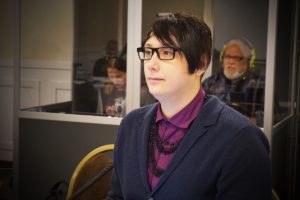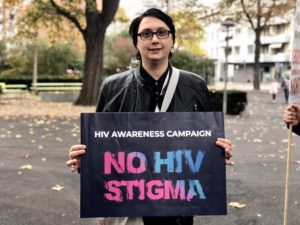 Living in society and being a victim of all kinds of violence is unfortunately becoming the norm for transgender people in Ukraine. Stigma and discrimination, as well as police violence at times, restrict transgender people’s access to the law enforcement system and to quality medical services.
Living in society and being a victim of all kinds of violence is unfortunately becoming the norm for transgender people in Ukraine. Stigma and discrimination, as well as police violence at times, restrict transgender people’s access to the law enforcement system and to quality medical services.
Igor Medvid, Coordinator of the Ukrainian organization HPLGBT and a grantee of the Emergency Support Fund for Key Populations in EECA, told AFEW International about the problems that transgender people face in the country, as well as about the ways of solving them.
For reference:
HPLGBT is a public self-organization of transgender people, which has been representing interests of transgender (trans) community in Ukraine for 6 years. HPLGBT is a membership association of a national scope that works in favor of high-risk groups for HIV infection, particularly, transgender people.
Igor, HPLGBT has done some research on transgender people. Could you tell us a little about it?
We are confident that advocating for the rights and interests of key populations is not possible without a thorough study of the situation.
When conducting research, not only we discover the issues that might be hidden from service-providing organizations, but also develop key recommendations for decision makers and service providers.
In 2019, through community efforts, we conducted a monitoring of human rights observance in relation to transgender women involved in sex work. As a result, we put together Alternative report on implementation of the convention on the elimination of all forms of discrimination against women. This report was implemented with the support of the Emergency Support Fund for Key Populations in Eastern Europe and Central Asia region, and it describes 61 cases of the rights violation of trans people, including information on the most common human rights violations. We also studied the specifics of chemical sex and the problems faced by people who practice it.
We hope that the Secretariat of the Commissioner for Human Rights of the Supreme Council of Ukraine will soon include all our recommendations on reforming and humanizing the policies into their annual report. Such actions will help us in advocacy.
In addition to this, we are sending the recommendations to all those who are forming national HIV programs, in order to include important services for transgender people, and we hope that the programs will be changing in accordance with the expectations and needs of those for whom they are implemented.
Financing for non-profit organizations in the EECA region sometimes leaves much to be desired. How do you survive in such conditions?
Our main source of income is small grants, which we get intermittently, therefore, unfortunately, our organization most often operates on a situational basis. However, even with the limited means of small grants, we manage to do a lot in strengthening the voice of transgender people. Our work is based on human rights and freedoms, and when planning activities, we try to focus on studying situations with the groups of trans people that are most in need of help. Our main key population groups are transgender sex workers or transgender people who practice chemical sex. Such groups face multiple stigmatization due to their deliberate involvement in sex work, their gender identity, sexual orientation, HIV status, and drug use.
Even though funding is declining, there are still opportunities for receiving money. We approached the Emergency Support Fund several times, and thanks to its grants, we were able to survive during this difficult time. We also transferred our skills to the community, and now the MSM community of sex workers, including those who practice chemical sex, has begun the process of mobilizing and helping each other. We help them with this by providing multilateral support, including technical assistance.
As for advocacy goals and objectives, we plan to continue to participate in increasing access to HIV testing, treatment and prevention, including AIDS prevention through interventions focused on commitment, support and care. We plan to promote interventions to suppress HIV replication as a result of ART (viral suppression), as well as participate in the promotion of sexual and reproductive health rights.
What is your most memorable case?
Recently, I was greatly shocked by the incident of rape, robbery and torture of a transgender person in the Zhytomyr region. Six malefactors, one of whom the trans person had met on a dating site, tortured him/her for a long time: having handcuffed the victim, they beat him/her up, threatened with a knife, cut off the clothes and raped him/her. However, the worst thing is that instead of investigating the attack as a hate crime, the police qualified it only as “robbery,” thereby causing the outrage from human rights defenders. We are deeply convinced of the homophobic/transphobic motive of this incident.
What difficulties do you encounter in your work?
The biggest difficulties arise due to the fact that nowadays there are no effective mechanisms for protecting the rights of transgender people in Ukraine. Investigations of crimes like the one I described are not adequate and exclude hate motives. Unfortunately, the Action Plan for the implementation of the National Human Rights Strategy has not been properly implemented.
Also, there is still no direct mention in the list of the Ukrainian Ministry of Health that transgender people are a key population group in the context of HIV. And, of course, the package of services that is provided in HIV prevention programs does not always meet the needs of transgender people. Especially if these people are representatives of sub-groups.
How do community members feel about your activity?
Differently. There are those who are grateful to us and often help the organization. Especially those who have already received help from us, and we have met their expectations.
But there are also those who are dissatisfied. For example, HPLGBT members and I often hear things like: “If you didn’t stick out, nobody would touch us,” or for example, “We were not touched, but now, because of your gay prides, we expect constant attacks by thugs (gopniks) or skin-heads.”
Once again this proves that people have little understanding of the fact that visibility is one of the most important components in protecting and expanding the rights not only of transgender people, but also of all other key population groups. We should make more efforts to educate and inform the public about the importance of visibility for diverse communities, to strengthen the voice of stigmatized and discriminated groups and, overall, to build an open and strong society.




